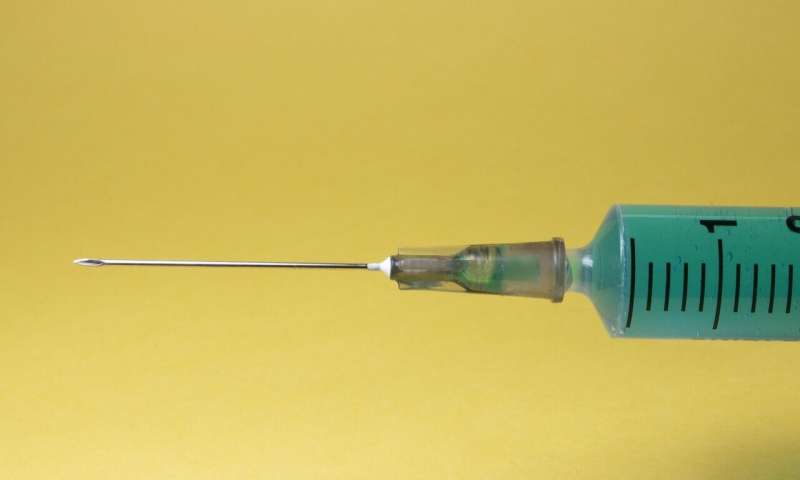This article has been reviewed according to Science X's editorial process and policies. Editors have highlighted the following attributes while ensuring the content's credibility:
fact-checked
trusted source
proofread
Vaccine shows promise against cytomegalovirus, a virus that causes birth defects

An experimental mRNA vaccine against human cytomegalovirus (CMV), a common virus that can infect babies during pregnancy, elicited some of the most promising immune responses to date of any CMV vaccine candidate, according to a study by Weill Cornell Medicine investigators.
The study, published in The Journal of Infectious Diseases, provided evidence that the new mRNA vaccine candidate, which is manufactured by Moderna, Inc., may protect adults against CMV. Thus, it could potentially prevent women from passing the harmful infection to their babies during pregnancy.
Compared with a previously moderately successful vaccine candidate called gB/MF59, the mRNA vaccine-elicited responses that were better at preventing the CMV virus from infecting epithelial cells that line the mouth and nose and provide the first line of defense against viral infection. The mRNA vaccine was also more effective at triggering the immune system to destroy CMV-infected cells.
"We learned that the newer vaccine has the potential to be more effective than a previous CMV vaccine candidate because some of the functional immune responses it elicits are higher in magnitude," said senior author Dr. Sallie Permar, the chair of the Department of Pediatrics and Nancy C. Paduano Professor in Pediatrics at Weill Cornell Medicine. "An ongoing clinical trial will confirm if those differences lead to greater protection against CMV infection."
Though healthy adults are largely asymptomatic, one in every 200 newborns worldwide is infected with CMV during the mother's pregnancy. "It is the most common congenital infection worldwide," said Permar, who is also pediatrician-in-chief at NewYork-Presbyterian/Weill Cornell Medical Center and NewYork-Presbyterian Komansky Children's Hospital.
While the virus rarely causes serious illness in healthy adults, it can cause birth defects and brain damage in newborns infected in utero and deadly infections in immune-compromised adults.
Co-first authors Krithika P. Karthigeyan, a postdoctoral associate in pediatrics at Weill Cornell Medicine, and Xintao Hu, who was part of the research team at the time, also contributed to this research.
Previously, Sanofi and Novartis had developed vaccine candidate gB/MF59, which targeted glycoprotein B (gB), a sugar-laden viral surface protein that works with other proteins to help CMV attach to and enter human cells. It protected about half of vaccinated individuals from CMV infection in a phase 2 clinical trial led by the National Institute of Allergy and Infectious Diseases Vaccine Clinical Trials Network. When the trial ended in 2013, it did not progress to phase 3 clinical trials.
Permar and her colleagues used the data and patient samples from the gB/MF59 phase 2 trial in adolescent girls as a benchmark to assess the new mRNA-based vaccine. Using the same technology that produced the company's COVID-19 vaccine, Moderna's CMV vaccine added a second target—a five-unit protein complex that allows the virus to infect the epithelial cells that line the nose and mouth—in addition to glycoprotein B.
In this study, Permar and her team compared the immune responses of individuals vaccinated with gB/MF59 in the phase 2 trial with those immunized with Moderna's mRNA-based CMV vaccine in a phase 1 clinical trial that ended in 2020. Specifically, the team compared the immune responses in people who were protected against CMV infection after receiving the older vaccine.
The mRNA vaccine—likely because of the additional second target—did a better job of preventing the CMV virus from infecting healthy epithelial cells. The vaccine triggered immune cells to produce neutralizing antibodies that block the entry of the virus into a cell, which prevents viral replication.
Also, the mRNA vaccine-induced antibody responses could destroy infected cells. In contrast, people vaccinated with the gB/MF59 vaccine produced higher levels of antibodies against gB that had low neutralizing activity but had a strong ability to engulf and eliminate a virus.
The Moderna vaccine has moved on to the first-ever phase 3 clinical study for a CMV vaccine candidate, which will help determine if these differences in immune responses will lead to stronger protection against CMV.
"After more than 50 years of research, we are closer than ever to having a licensed CMV vaccine," Permar said. "The new mRNA platform has a lot of potential."
In the meantime, Permar and her colleagues have developed a preclinical model to test whether similar vaccines protect against fetal CMV transmission during pregnancy.
More information: Xintao Hu et al, Human Cytomegalovirus mRNA-1647 Vaccine Candidate Elicits Potent and Broad Neutralization and Higher Antibody-Dependent Cellular Cytotoxicity Responses Than the gB/MF59 Vaccine, The Journal of Infectious Diseases (2024). DOI: 10.1093/infdis/jiad593


















